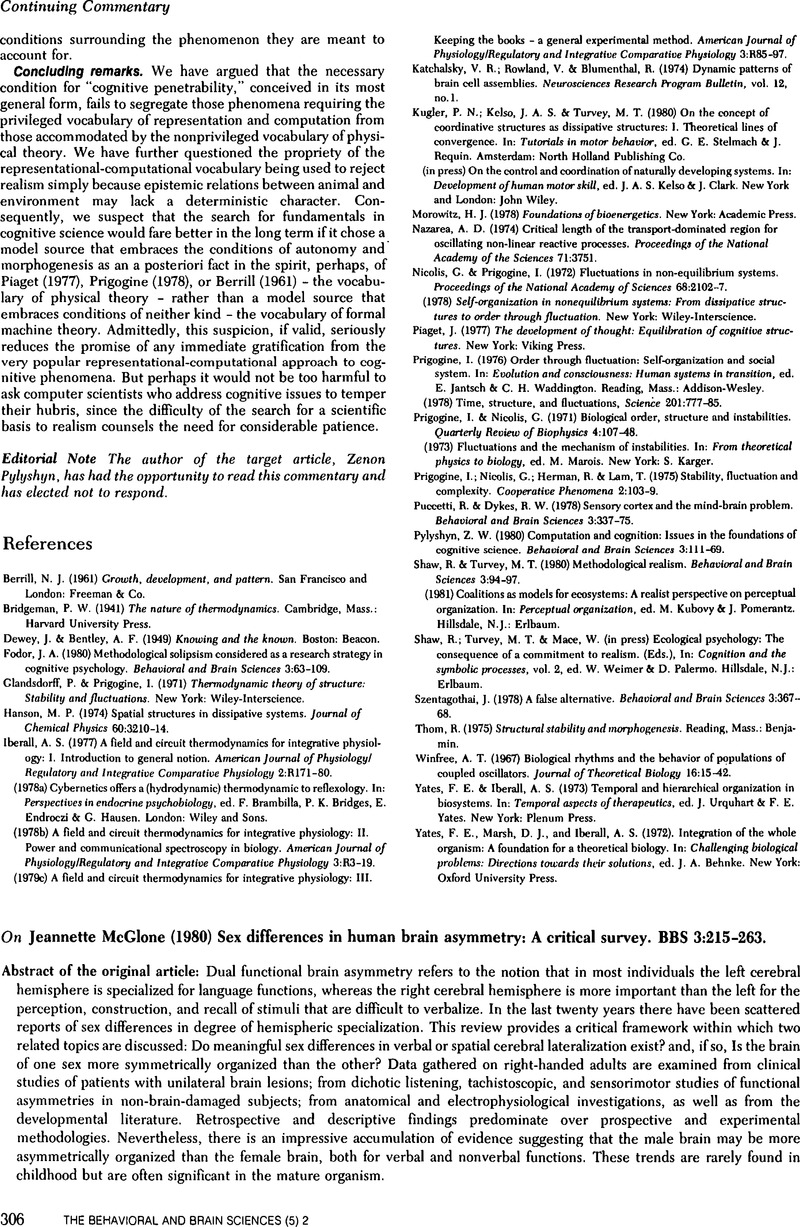Crossref Citations
This article has been cited by the following publications. This list is generated based on data provided by Crossref.
Wood, Frank
1983.
Cortical and thalamic representation of the episodic and semantic memory systems:Converging evidence from brain stimulation, local metabolic indicators, and human neuropsychology.
Behavioral and Brain Sciences,
Vol. 6,
Issue. 2,
p.
220.
Marshall, John C.
1983.
A rose by any other name.
Behavioral and Brain Sciences,
Vol. 6,
Issue. 2,
p.
216.
Tallal, Paula
1983.
A precise timing mechanism may underlie a common speech perception and production area in the peri-Sylvian cortex of the dominant hemisphere.
Behavioral and Brain Sciences,
Vol. 6,
Issue. 2,
p.
219.
Boller, François
1983.
Phrenology, 1982: What does it tell the aphasiologist?.
Behavioral and Brain Sciences,
Vol. 6,
Issue. 2,
p.
207.
Liberman, Alvin M.
1983.
What a perception–production link does for language.
Behavioral and Brain Sciences,
Vol. 6,
Issue. 2,
p.
216.
Newman, John D.
1983.
On models, mechanisms and the evolution of human language.
Behavioral and Brain Sciences,
Vol. 6,
Issue. 2,
p.
217.
Cooper, William E.
1983.
Brain cartography: Electrical stimulation of processing sites or transmission lines?.
Behavioral and Brain Sciences,
Vol. 6,
Issue. 2,
p.
212.
Churchland, Patricia Smith
1983.
Ojemann's data: Provocative but mysterious.
Behavioral and Brain Sciences,
Vol. 6,
Issue. 2,
p.
211.
Frazier, Lyn
1983.
Motor theory of speech perception or acoustic theory of speech production?.
Behavioral and Brain Sciences,
Vol. 6,
Issue. 2,
p.
213.
Lehnert, Wendy G.
1983.
Language: Where Al and the neurosciences aren't meeting.
Behavioral and Brain Sciences,
Vol. 6,
Issue. 2,
p.
215.
Brown, Jason W.
1983.
Stimulation maps from the standpoint of aphasia study.
Behavioral and Brain Sciences,
Vol. 6,
Issue. 2,
p.
207.
Buckingham, Hugh W.
1983.
Neurolinguistic and philosophical implications of electrical stimulation mapping of the human brain.
Behavioral and Brain Sciences,
Vol. 6,
Issue. 2,
p.
209.
Calvin, William H.
1983.
Timing sequencers as a foundation for language.
Behavioral and Brain Sciences,
Vol. 6,
Issue. 2,
p.
210.
Ojemann, George A.
1983.
Electrical stimulation and the neurobiology of language.
Behavioral and Brain Sciences,
Vol. 6,
Issue. 2,
p.
221.
Ojemann, George A.
1983.
Brain organization for language from the perspective of electrical stimulation mapping.
Behavioral and Brain Sciences,
Vol. 6,
Issue. 2,
p.
189.
Kent, Raymond D.
1983.
Windows to the brain: Functional impairment and the surgical field.
Behavioral and Brain Sciences,
Vol. 6,
Issue. 2,
p.
214.
Studdert-Kennedy, Michael
1983.
Mapping speech: More analysis, less synthesis, please.
Behavioral and Brain Sciences,
Vol. 6,
Issue. 2,
p.
218.
Calvin, William H.
1983.
A stone's throw and its launch window: Timing precision and its implications for language and hominid brains.
Journal of Theoretical Biology,
Vol. 104,
Issue. 1,
p.
121.
Hanske-Petitpierre, Verena
and
Chen, Andrew C. N.
1985.
Sex differences in brain organization: Implications for human communication.
International Journal of Neuroscience,
Vol. 28,
Issue. 3-4,
p.
197.
McGlone, Jeannette
1986.
Advances in Clinical Neuropsychology.
p.
1.



